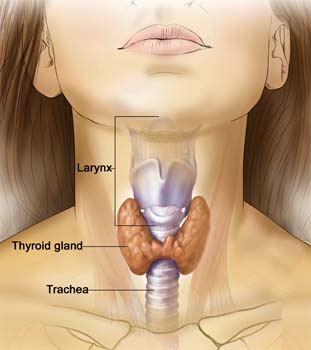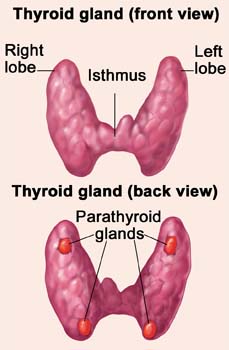
Underactive thyroid or hypothyroidism is derived from the Greek word, hypo meaning "less" and thyreos meaning "shield", and eidos, meaning "shape or form".
The thyroid gland is an important endocrine gland that helps in maintaining metabolism of the body. Low levels of thyroid hormone interfere with the body's ability to perform normal metabolic functions such as use of energy from food products, regulation of many bodily chemicals and maintenance of cells, bones and muscles.
STRUCTURE
Let us first understand the structure and functions of thyroid gland.

- Thyroid gland is a small, butterfly-shaped gland located in the front of the neck which stimulates vital processes in every part of the body.
- It controls how your body's cells use energy derived from food, a process called metabolism. Thyroid gland produces the hormones tetraiodothyronine (T4) and triiodothyronine (T3) that travel throughout the bloodstream and affect nearly every part of our body, from the heart and brain to muscles and skin.
-
These thyroid hormones have a major impact on the following functions:
- Growth
- Use of energy and oxygen
- Heat production
- Fertility
- Heart rate
- Controlling body temperature
- Regulation of production of proteins
- The pituitary gland, located at the base of brain, secretes thyroid-stimulating hormone (TSH), which stimulates the thyroid to produce and release T3 and T4. Iodine (obtained through food) is essential for the secretion of thyroid hormones.
- In case of Hypothyroidism, the thyroid gland starts producing low quantities of T4 and T3. Low levels of thyroid hormones act as a reverse stimulant for the pituitary to secrete large quantities of TSH in a bid to increase thyroid hormone levels.
CLASSIFICATION
Hypothyroidism is classified on the basis of severity as:
- Subclinical Hypothyroidism- In this, thyroid function is mildly low so that the level of thyroxine remains within the normal range, but the blood level of TSH is elevated, indicating mild thyroid failure.
- Overt or frank Hypothyroidism- Here, the levels of thyroxine are actually below normal and may cause fatigue, weight gain, cold intolerance, dry skin, and an increased risk of heart problems.















